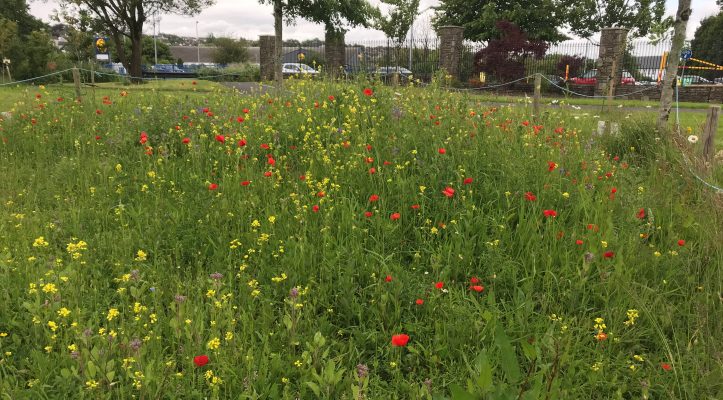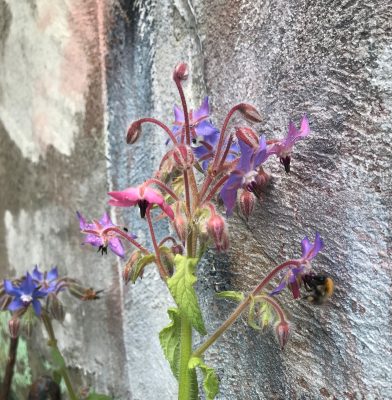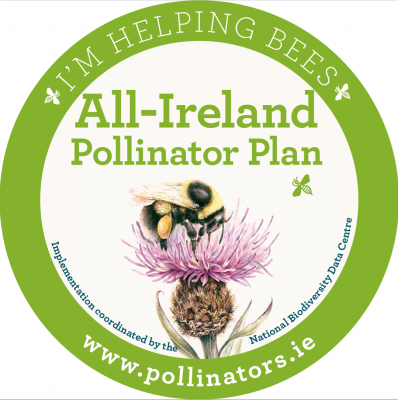People for Bees delivers introductory training on Ireland’s bees, bee monitoring and bee friendly habitat creation.
The Irish Wildlife Trust works with the National Biodiversity Data Centre to support the All-Ireland Pollinator Plan and the Bumblebee Monitoring Scheme. With the new skills learnt through our People for Bees programme, participants have the knowledge and confidence to start carrying out bee population monitoring and habitat creation in their communities, thus completing two of the objectives of the All Ireland Pollinator Plan – “Making Ireland more pollinator friendly” and “Bee population monitoring”.
Our Bee Workshops
Since 2017 we have been delivering introductory training on Ireland’s bees, bee monitoring and bee friendly habitat creation both virtually and with practical workshops.
We will be running People for Bees events this year. Keep an eye on our events page for details – https://iwt.ie/events/
For information on our People for Bees programme contact bees@iwt.ie
NEWS
Magazine Article
Download our latest feature article on solitary bees The Secret Life Of Solitary Bees by Úna FitzPatrick
People for Bees with Cork County Council
In 2021 we delivered virtual People for Bees workshops to community groups in County Cork with support from Cork County Council. These workshops worked with groups from right across Cork county. Through this project we provided community groups with two free workshops;
Workshop 1:- An introduction to the wild bees of Ireland, why they are important and how to help them through habitat creation.
Workshop 2: An introduction to wild bee identification, recording and monitoring.
The aim of the project is to support these community groups to take steps to create bee and nature friendly habitat within their own community and in their own back gardens. Groups can also take part in bee monitoring to discover which bees are living in their local area as well as to monitor the success of their habitat creation work. Groups are taught how to share their bee records with the National Biodiversity Data Centre.

Community habitat creation – part of an urban Pollinator Plan in Carrigaline

Small Steps: “I have a small concrete yard , but after the first workshop, I planted Borage, Crimson clover and blue cornflowers for the bees and they love them”
This project was kindly supported by Cork County Council
Bee Friendly Gardening
Tip 1: Don’t mow – let it grow: Anyone who has a lawn has the ability to help our bees by simply cutting the grass less. Traditionally we keep grass areas cut short and neat, even taking a sense of pride in our prize lawns. Such lawns of short cut grass are deserts for bees providing no food whatsoever, but you can change this. If you cut your grass less frequently, every four to six weeks, all of a sudden wildflowers such as dandelions and clover will appear. These flowers provide food (pollen and nectar) for our bees. You will have created an important habitat right in your back garden. So don’t worry about what the neighbours think don’t mow let it grow! For more tips of managing grassland see the All Ireland Pollinator Plan blog here
Tip 2: Remove Pesticides: Pesticide are chemical substances used to kill insects, plants and fungus in agriculture, gardening and landscaping. They can harm bees and other insect in a number of ways either directly harming to the health of the insect or by destroying vital habitat. Making your garden a pesticide free zone will make it safer for bees and all nature.
The All-Ireland Pollinator Plan
In 2015 Ireland, North and South, developed a strategy to address pollinator decline and protect pollination services, this is called the All-Ireland Pollinator Plan and it is coordinated by the National Biodiversity Data Centre. The plan website is www.pollinators.ie

Sixty-eight governmental and non-governmental organisations agreed a shared Plan that identifies 81 actions to make Ireland pollinator friendly. You can take part, using the guides and resources provided by the National Biodiversity Data Centre for your garden, school, local community group or council and map those actions on the online mapping system, Actions for Pollinators, to help track the build-up of food and shelter in our landscape.
FUNDERS
The IWT People for Bees project was established with supported from Patagonia